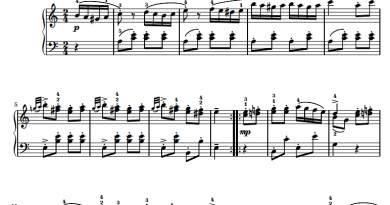Types of C major scales for piano and Muzio Clementi Sonatina
The C scale in Contrary motion being the easiest is first introduced.

The C scale in parallel motion

Scale in Sixths

Scale of C, contrary motion, beginning on E with the right and left hands.

Scale of C, beginning on G with the right and left hands

Scale of C, beginning on C with the right, and E with the left hand.

Scale of C, beginning on E with the right, and on C with the left hand.

Scale of C, beginning on G with the right, and OB C with the left hand.

Scale of C, beginning on G with the right, and on E with the left hand.

Scale of C, beginning on E with the right, and on G with the left hand.

Sonatina : Muzio Clementi : studying major scales
Having faithfully studied and thoroughly mastered the scales as given above, the pupil will now be permitted to study the following pretty piece by one of the famous Italian masters. Muzio Clementi was born in Home ‘.n 1752, and died in the Vale of Evesham, England, on the 9th of March, 1832. He was a remarkable composer and a very fine player. His sonatas and sonatinas are great favorites, and deserves to be studied. A sonata is a musical composition consisting of three, four or even five parts. Although these several parts differ in character they form one whole, and for this reason must be spiritually related to one another the whole must be characterized by a spirit of unity. A sonatina is a small sonata, usually consisting of two, sometimes of three parts. Clementi has written many sonatas as well a sonatinas.
Allegro from the Muzio Clementi’s Sonatina no. 1 in C major key


Considerations on major scales
Note to the teacher: It is of the utmost importance that the pupil learn to play the scales in all their various forms and combinations. The following scales are all written in thirds, beginning at different tones in the scale. Though each begins at a different tone, yet the same fingering used in the C major scale is applied throughout. The teacher should in every way convince the pupil of the necessity of a thorough study of the scales, and should be firm in his demands that this work be done.



